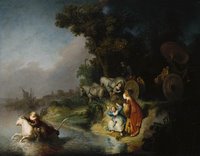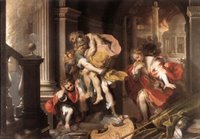 Suetonius' Lives of the Caesars is one of the most important sources for the period following Nero's Death. Among his "Twelve Caesars" are Galba, Otho, Vitellius, Vespasian, Titus, and Domitian Suetonius includes all sorts of fascinating biographical details about the men he describes--along with plenty of sometimes unverifiable gossip and rumor.
Suetonius' Lives of the Caesars is one of the most important sources for the period following Nero's Death. Among his "Twelve Caesars" are Galba, Otho, Vitellius, Vespasian, Titus, and Domitian Suetonius includes all sorts of fascinating biographical details about the men he describes--along with plenty of sometimes unverifiable gossip and rumor.For extra credit, please read Suetonius account of any one of the casesars of this period (links above) . Pick an incident from the life of this caesar that shows a way in which Augustus' system (the principate) can work well, or an incident that shows that system created by Augustus was not working out particularly well.
If you have fallen behind on your blogs, you can add to your extra credit by doing an extra blog entry on a *different* ceasar than you talk about in your first post.



